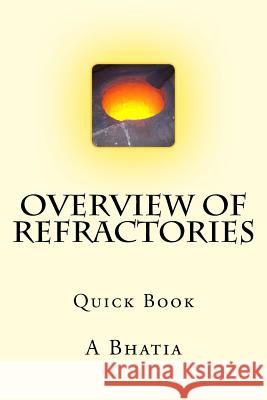Overview of Refractories: Quick Book » książka
Overview of Refractories: Quick Book
ISBN-13: 9781505407327 / Angielski / Miękka / 2014 / 68 str.
Refractories are inorganic, nonmetallic heat resistant materials that can withstand extreme temperatures, and in many cases chemical attack, abrasion, thermal shock and rough handling. These are widely used in the lining of high temperature surfaces viz. furnaces, kilns, reactors and other processing units in manufacturing, thermal, metallurgical and chemical equipments worldwide. Refractory selection for a specific application is invariably built upon a combination of material qualities and its composition. Refractories are expensive, and any failure in the refractories can result in a great loss of production time, equipment, and sometimes the product itself. The various types of refractories also influence energy consumption and product quality; therefore, the problem of obtaining refractories best suited to each application is of supreme importance. This 5 hour quick book provides insight to the type of refractories, their properties and applications, and how they may be applied to give better fuel efficiency and service life. This course is aimed at mechanical, chemical & process engineers, working in chemical, thermal, metal & mining, manufacturing and engineering industries. Learning Objective At the conclusion of this course, the student will be aware of: The function and application of refractories; The characteristics and properties of refractories; The classification and types of refractories; The potential benefits of refractories; The forms and shapes of refractories; The typical refractories used in industrial use; The selection aspects of right refractory material; The potential heat losses and conservation of energy; The refractory use in metallurgical furnaces, kilns and miscellaneous equipment"
Zawartość książki może nie spełniać oczekiwań – reklamacje nie obejmują treści, która mogła nie być redakcyjnie ani merytorycznie opracowana.











